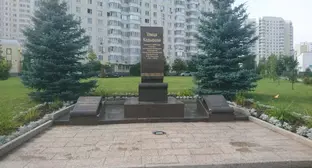24 April 2017, 09:00
Week in the Caucasus: review of main events of April 17-23
Court judgement to ban Jehovah's Witnesses in Russia; sending the second battalion of military police from Chechnya to Syria; ongoing truckers’ protests in Southern Russia, – see the review of these and other events in the Caucasus during the week of April 17-23, 2017, prepared by the "Caucasian Knot".
Court rules to ban Jehovah's Witnesses in Russia
On April 20, the Russia’s Supreme Court (SC) satisfied the demand of the Ministry of Justice (MoJ) to liquidate all the 396 Russian religious organizations of Jehovah's Witnesses, including their Administrative Centre located in Saint Petersburg. Besides, the SC has ruled to confiscate the organizations’ property. Earlier, eight local religious organizations were closed by courts’ rulings after the literature regarded as extremist was found in their premises. The respondent’s representatives asserted that the prohibited materials were planted into the liturgical buildings of Jehovah's Witnesses by law enforcers. They treat the ban as political repressions, and the SC’s verdict as biased. The total number of parishioners of Jehovah's Witnesses in Russia is about 300,000.
The international Human Rights Watch (HRW) has treated the Russian SC’s judgement as a blow on the freedom of conscience. This opinion was supported by the European Union, the German Ministry of Foreign Affairs, and the British and US authorities.
Updated draft of Georgian Constitution adopted without oppositionists
On April 22, the State Constitutional Commission of Georgia adopted, by the majority vote, the updated draft of the country’s Constitution. The country’s Ombudsperson (known also as People’s Defender) public defender and representatives of the civil sector has voted against. Oppositionists were not present at voting, as they had quitted the commission in protest against the fact that their initiatives on fundamental issues, including the way to elect the president and rules for holding parliamentary elections, were disregarded. According to the amendments, the president will be elected by the Electoral Collegium, while the opposition and non-governmental organizations (NGOs) had sought to elect the president by direct voting. This week, the above commission was abandoned by the "Alliance of Patriots", the "Democratic Movement-United Georgia", the "Free Democrats", the "European Georgia" and the Labour Party; earlier, the "State for the People" Party and the "United National Movement" had refused to work in the commission. The nationwide consideration of the draft will last until the end of April.
New president of South Ossetia takes office
On April 21, Anatoly Bibilov, who was elected the president of South Ossetia during the election on April 9, took office. The ceremony was held at the stadium in Tskhinvali, housing more than five thousand people. It was attended by Leonid Tibilov and Eduard Kokoity, the former presidents of South Ossetia, Taimuraz Mamsurov, the former head of North Ossetia, and delegation from Abkhazia, Chechnya and the State Duma of Russia.
Second battalion of military police leaves Chechnya for Syria
A new battalion of military police has left Chechnya for Syria to replace the servicemen, who returned from there in March. As reported on April 19 by the “Rosbalt” with reference to its source, in Syria, the battalion will be busy guarding the airfield, patrolling, and escorting humanitarian supplies. The term of the battalion’s military mission will not exceed three months, Ramzan Kadyrov, the head of Chechnya, has confirmed. The Chechen battalion will no take part in the warfare, but will ensure the security of the Russian contingent in Syria, said the experts, interviewed by the "Caucasian Knot". According to Alexander Perendjiev, an expert of the Association of Independent Military Political Scientists, the Chechen unit may take part in hostilities "if they break out in the conditions of escorting and a threat to humanitarian supplies." Let us note here that in February it was also reported that a battalion of military police from Ingushetia has been sent to Syria.
Head of Russia’s MFA visits Abkhazia
On April 18-19, Sergey Lavrov, the head of the Russia’s Ministry of Foreign Affairs (MFA), was in Abkhazia. On the first day of his visit, he took part in the opening ceremony of the new building of the Russian Embassy in Sukhumi. On April 19, Minister Lavrov held talks with President Raul Khajimba and his colleague Daur Kove – the head of the Abkhaz MFA. Among the discussed issues there were the deepening of bilateral relations and the main areas of interaction at the Geneva debates on stability and security in Transcaucasia. The Georgian MFA treated the Lavrov's visit as a provocation, and the Georgian President Giorgi Margvelashvili called on the international community to "resolutely condemn" the Russia's actions. This visit means that Russia does not want to normalize relations with Georgia, said the Georgian political analysts, interviewed by the "Caucasian Knot". Their Russian counterparts have associated the Lavrov's visit with the parliamentary elections in Abkhazia, calling the acquaintance with the new speaker of the parliament and the situation after the internal political conflict as the visit's goals, and predicted the possible upcoming replacement of the ambassador.
Cargo ship crashes at sea near the shore of the Krasnodar Territory
On April 19, in the Black Sea, 24 kilometres off the settlement of Taman, a dry cargo ship "Heroes of Arsenal", sailing under Panama's flag and carrying grain from the Azov Port in the Rostov Region to Turkey, disappeared from radars. Its crew made 12 persons – nine citizens of Ukraine, two Russians and one citizen of Georgia. The ship suffered a wreck. One of the crew members was saved; three were found dead and identified. The rescued one was a citizen of Ukraine. The active phase of marine search was stopped on April 20. Eight out of the twelve crew members are still missing; the search operation continues with the participation of the ships passing by wreck venue.
Truckers of Southern Russia continue protesting against "Platon" system
In Southern Russia, truckers continue their protests with a demand to abolish the "Platon" system, introduced in 2015 to collect fees for the travel of heavy trucks on federal highways. One of the most numerous is the action at the Dagestani town of Manas. Here, according to data on April 23, the number of trucks exceeded 350. Also, truckers of Ingushetia are on strike, reproaching the authorities for the absence of reaction to their protests. The truckers of the Volgograd Region are also dissatisfied with the reaction of the authorities; they demanded a meeting with the Governor Andrei Bocharov. In Astrakhan, on April 20, Deputies of the Regional Duma addressed the Government of the Russian Federation, stating the need to revise tariffs of the "Platon" system. In response, the Astrakhan strikers demanded a complete abolition of the “Platon” system and warned about the risk of losing the crops as a result of their refusal to work.
At the same time, some truckers have given up their protests. Thus, on April 19, truckers of North Ossetia announced the completion of their action, decided to establish their own transport company and trade union to help them in concluding transportation contracts and solve other truckers' problems. On April 20, Kuban (Krasnodar Territory) truckers stated their disappointment with the action and expressed their intention to resume their work.




